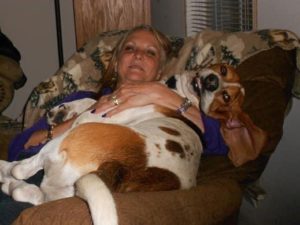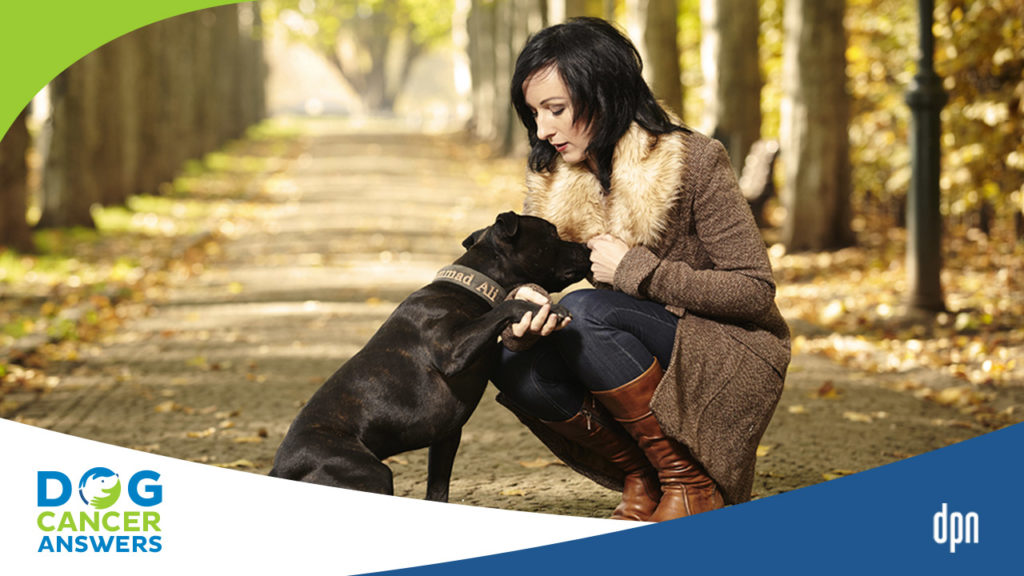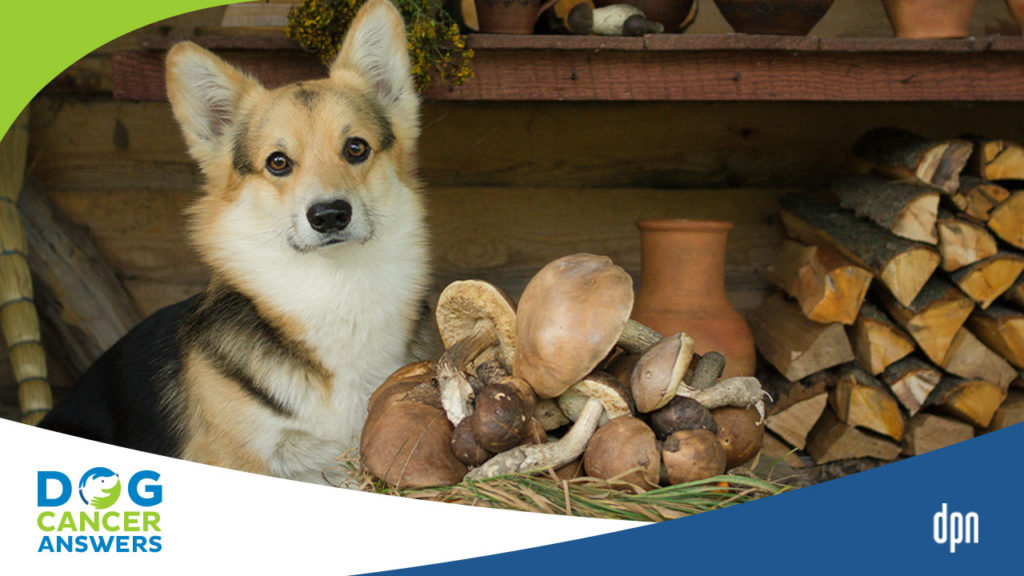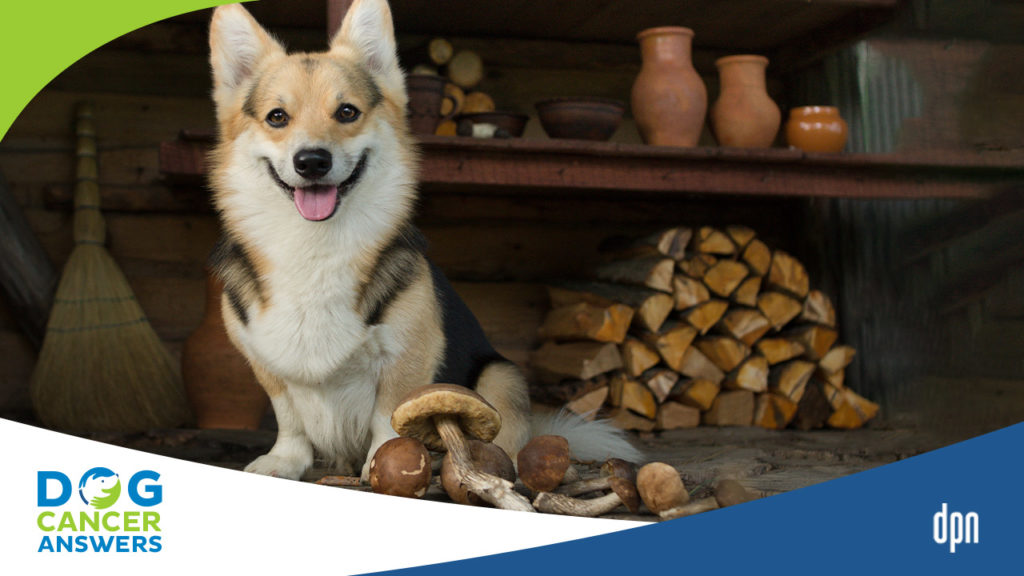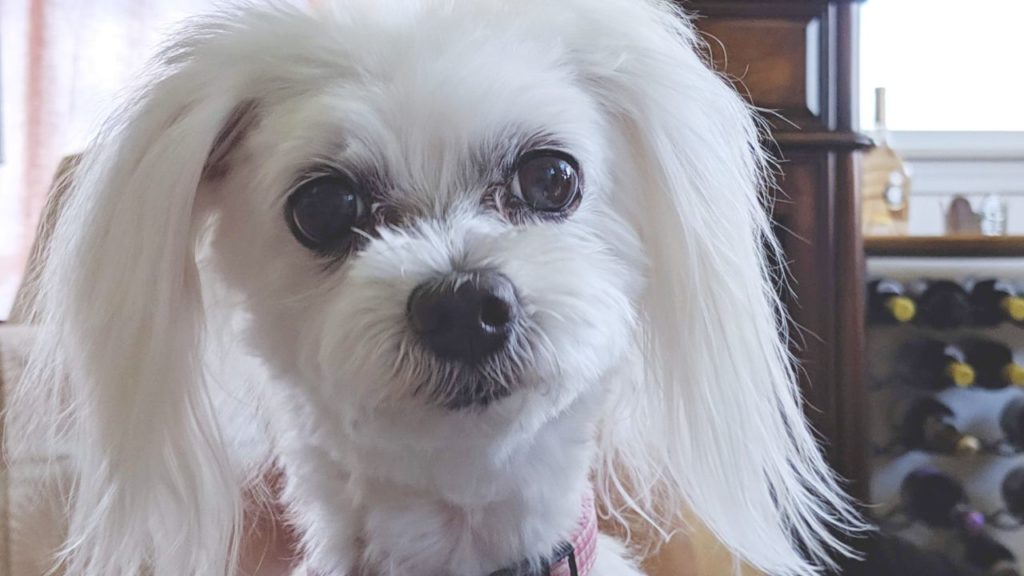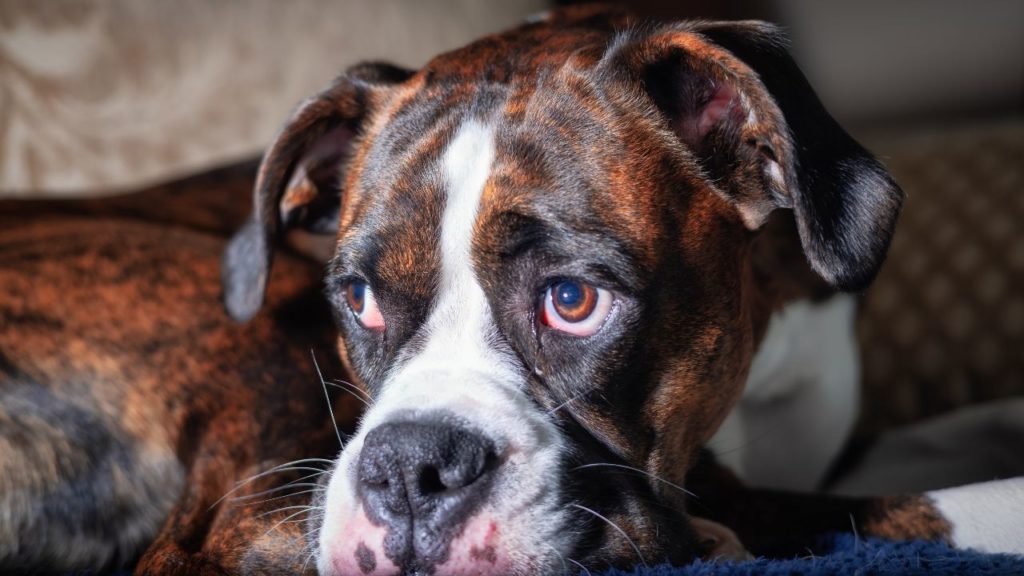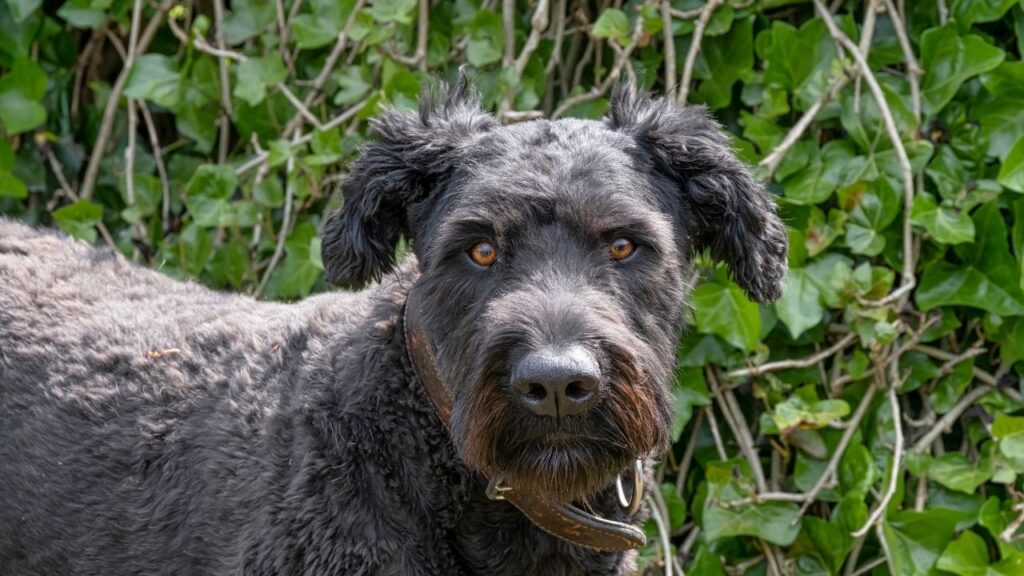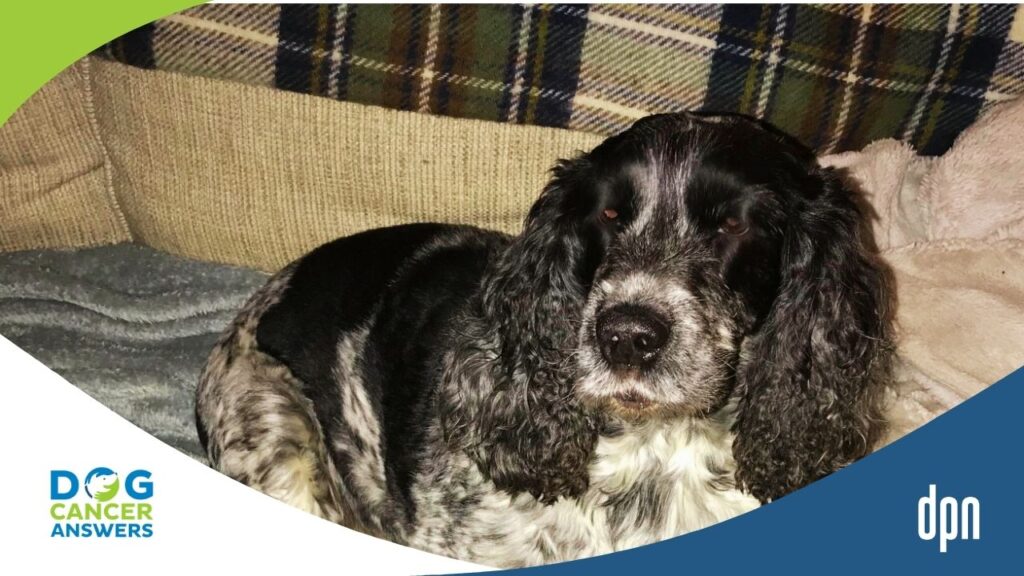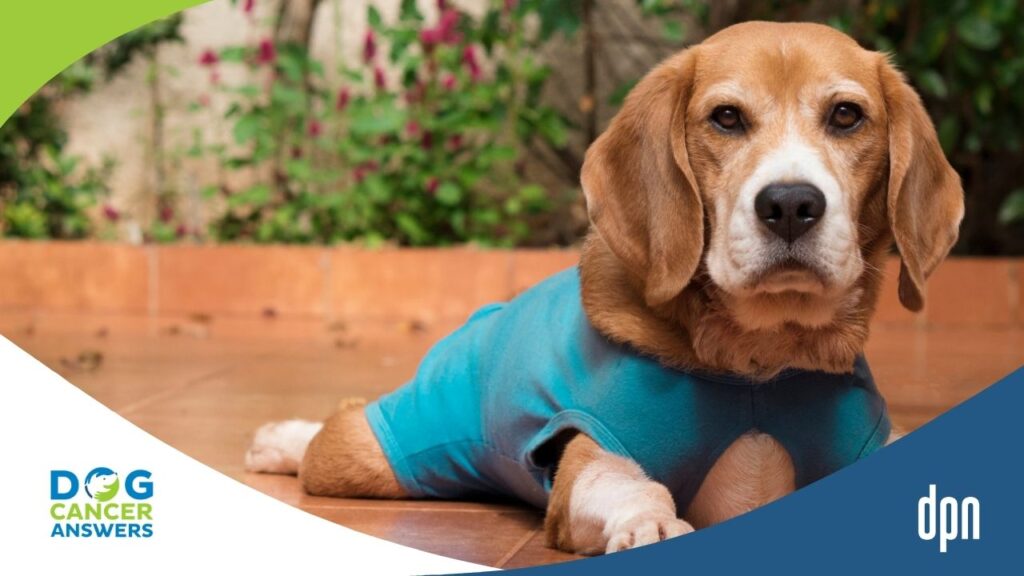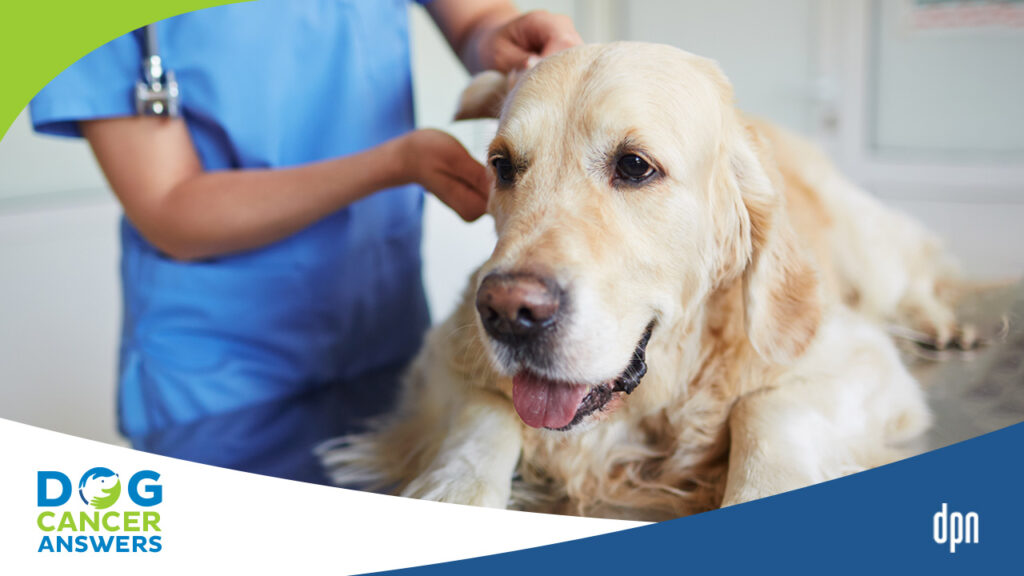EPISODE 205 | RELEASED February 27, 2023
Dog Cancer True Tail: Roscoe’s Legacy | Renée Michael
Roscoe the Bassett Hound fought prostate cancer for 21 months, and his mom is sharing everything she learned that helped him thrive.
SHOW NOTES
Dog prostate cancer can be missed because early symptoms look like simple UTIs, but when Renée Michael felt something was wrong with her beloved Roscoe, she didn’t wait. A full veterinary workup at Louisiana State University revealed prostate cancer.
Over the next 21 months, Renée learned a ton about the treatment options from prostate cancer, the value of having both an oncologist and a holistic vet on the care team, and how she could support Roscoe’s wellbeing at home with diet and supplements.
In this episode Renée shares some of her insights into anti-inflammatory foods and immune support supplements that she feels Roscoe, as well as recipes for some of his favorite treats. She also talks about the work that she has done to promote dog prostate cancer awareness and help other dog lovers get an early diagnosis and support their dogs throughout treatment.
Links Mentioned in Today’s Show:
Dogs with Prostate Cancer support group: https://www.facebook.com/groups/1522248491239039/?ref=share_group_link
Roscoe’s 21 Month Cancer Journey ebook with recipes: https://www.dogcancer.com/roscoe/
Related Links:
Roscoe the Basset Hound Bouncing Back After Cancer; Owner Advocates Early Detection
[00:00:00] >> Renee Michael: The other thing that just killed me when I got into the group is the number of dogs that came into the group where they had been having UTIs or other symptoms for six months to a year, and they never diagnosed prostate cancer. And so when they got in there in our group, they only had like two or three months left.
[00:00:20] >> Announcer: Welcome to Dog Cancer Answers, where we help you help your dog with cancer.
[00:00:26] >> Molly Jacobson: Hello, friend. Thank you for joining us today as we talk to Renee Michael about her amazing Bassett Hound, Roscoe, and his True Tail of cancer, specifically prostate cancer. Roscoe’s no longer with us, but his legacy is definitely living on and will well into the future as you’ll understand as we speak to Renee.
Renee, thanks so much for joining us today.
[00:00:58] >> Renee Michael: Thank you for having me.
[00:00:59] >> Molly Jacobson: I’m just thrilled to be able to talk to you in person. I’ve known you for a long time. You’re a very active and supportive member of our Facebook group, Dog Cancer Support, and of course, you’ve given us many tasty little treats recipes for our readers and our listeners over the years. And I just am so pleased that you’re here. You’re a big part of our community and I thank you for taking your time to be here today.
[00:01:28] >> Renee Michael: Thank you again.
[00:01:29] >> Molly Jacobson: So tell me about Roscoe. Tell me about his cancer diagnosis. Tell me about all the things, ’cause I know it’s a big story. So where do you wanna start?
[00:01:38] >> Renee Michael: Yeah. Okay. So he was a rescue, or I say he rescued me on Mother’s Day in 2011. He was one of the healthiest dogs I’ve ever had. But like I said, I have this thing, I call it my mommy spider sense when it comes to the dogs, ’cause they’re the only kids that I have. And my vet knows that if I tell her there’s something wrong or I think there’s something wrong, she knows she’s gonna check and make sure.
So with Roscoe there was something, I didn’t know what it was. Living 15 minutes from LSU, I can go there and say, "Can you do a full workup on my dog? Give me x-rays, give me ultrasounds, give me blood work." Because especially as he was-
[00:02:14] >> Molly Jacobson: That’s the Louisiana State University.
[00:02:15] >> Renee Michael: Oh, yes. Thank you. Louisiana State University. Yes, in Baton Rouge. And also he was about 11 years old, and I started that with Thibodaux, if one of my dogs gets older and there’s something that just seems off, I’ll take them over there and have them do a full workup. That way if there’s something they can find it. So I was thinking maybe, you know, maybe there was something with his liver, maybe his heart, something like that, ’cause he had had a heart murmur.
He had some liver problems early. And they come back and say prostate cancer. And I was just like, I was in shock.
[00:02:45] >> Molly Jacobson: What did you see? What were the symptoms that you saw?
[00:02:49] >> Renee Michael: I didn’t, he did not have any symptoms. He was just, I don’t know what it was. He was just, he just wasn’t himself and I can’t put a finger on it.
[00:02:57] >> Molly Jacobson: Your spidey senses are so good that your dog wasn’t actively acting as if he was sick, but you just knew something was wrong.
[00:03:06] >> Renee Michael: Yes.
[00:03:07] >> Molly Jacobson: And you went, got a full workup and they found prostate cancer.
[00:03:11] >> Renee Michael: Correct.
[00:03:11] >> Molly Jacobson: Wow. Yeah. Those are spidey senses.
[00:03:14] >> Renee Michael: Yeah. And that’s why I said I can’t, I can’t point to any one thing that said it was, there was a problem, but it was just something to me that he just seemed a little off, not majorly off, right, but a little off. So I said, well, let’s just take him in and get him checked. Can’t hurt, right? Costs money, but it can’t hurt. So that’s when they found the prostate cancer and I just kind of, you know, I lost it.
That was at the end of February in 2020. Yeah. We got to see oncology the next week. They talked about radiation, chemo, that kind of stuff, but they said before we discuss any of that, we need to do a CT scan to see if it spread. Because if it has metastasized, then that would change the treatment options, right?
So we went ahead and set up the CT scan and that’s about when COVID hit. So I was able to talk to them, I got a really good understanding of radiation, because the two offerings of radiation were the definitive radiation, which she said was like 20 sessions over four weeks every day, which was like a lot ’cause they have to put him under for each one.
And the other one was that she called SRT, stereotactic radiation I think is how you pronounce it. And she said that for him would just be three sessions, a Monday, Wednesday, and Friday, and then he’d be done. So I said, let’s do that. We’ll do that. We’ll get that over with, and then we’ll think about what comes after radiation, but let’s do that first.
COVID hit. Everything started shutting down. He was scheduled for one week, they pushed it. He was scheduled for another week. I said, uh. We did one session of chemo, ’cause I was panicking, thinking, not knowing anything about it, thinking it was gonna spread quickly, right? So we did one session of chemo, scheduled the radiation again, they started to push it again.
I started writing letters to the governor and to the mayor and everybody else because I said, you know, they got the hospitals open. This is lifesaving to my dog. If you could say, if it’s lifesaving for people, why can’t it be lifesaving for pets? So we got him in for his radiation. They said he can come in, if he can’t finish those three sessions of radiation, if we have to shut down, we won’t be able to finish it and it could cause problems.
And I said, I don’t care. Let’s do it. He got all three of ’em in. So he got his three sessions of radiation in. He did great. They sent us home with the appetite stimulant and um, diarrhea medicine ’cause they said that could happen after that. And I had a bland diet ready, so he was good. He flew through it. Dr. Looper said he flew through the radiation. He didn’t have any problems with it, where apparently some dogs do have problems with it.
So he didn’t have any problems with it. I was, was prepared with the bland diet, so I knew to do that up front, right? And he, like I said, they sent him some nausea medicine and some diarrhea medicine. He had a little bit of diarrhea, but he didn’t have, really have any side effects from the radiation at all, which was fantastic. It didn’t slow him down at all, which was fantastic.
So we gave him a couple weeks of that and then they said, okay, now we need to talk about chemo. And I am just not a big fan of chemo personally because of the, my background with stuff that has happened. So I said I need to talk to somebody about it. Well, with COVID, they were doing shifts, right? Some people would work and some people would stay home. So I got to talk to Dr. Looper who’s the head of oncology, and she told me, personally, she wouldn’t do it for her dog. So I said, well, that answers that question. And I went ahead with no chemo.
[00:06:27] >> Molly Jacobson: So why did your oncologist think that doing chemo initially was not a good idea?
[00:06:34] >> Renee Michael: Okay, well it, we caught it early and it hadn’t spread. The reason that she told me that is she said prostate cancer, most prostate cancers, okay, not all, but most prostate cancers – because there’s two, there’s the adenocarcinoma and there’s the TCC, so I imagine she was talking about the TCCs – initiate in the prostate and the bladder, and they are very, very slow to spread.
[00:06:57] >> Molly Jacobson: Ah.
[00:06:58] >> Renee Michael: And when she said chemo, she’s talking more about the systemic chemo, I think is the word she used, the one where it, it hits the whole body rather than the targeted chemo.
[00:07:08] >> Molly Jacobson: Yeah. Yeah.
[00:07:09] >> Renee Michael: So she said, those don’t work really good on the prostate cancers. So she said, what she recommends is if you catch it early enough and you can do the SRT radiation, the stereotactic radiation, do that initially and then you can wait until you or your oncologist or whatever feel comfortable with starting it. I didn’t feel comfortable with starting it, so we never did chemo on Roscoe.
[00:07:31] >> Molly Jacobson: Okay. Roscoe never got chemo. Roscoe got stereotactic radiation three times.
[00:07:37] >> Renee Michael: Three times. Correct. That was really the only thing that got, and then he was on meloxicam already because of his arthritis, ’cause the other thing they wanna do is they wanna put ’em on NSAIDs, ’cause NSAIDs are real key with prostate cancer. He was already on meloxicam, so they said, well, we’ll just leave him on that for now.
[00:07:52] >> Molly Jacobson: Okay. So they didn’t change the dose or anything, they just kept him on meloxicam?
[00:07:56] >> Renee Michael: Correct. I think he was on the 50 pound dose and they just kept him on that. So that’s when I started doing all our research in foods and stuff, right, because I said, there’s gotta be something that can help. ‘Cause I made all our own foods and I, I got the Dog Cancer Diet and I read through it and I was making his own food, so I said, well that’s really close to what I’m doing anyway. So I did that and I started changing some of it with the cruciferous vegetables and that kind of stuff.
And then when you start looking, there are certain foods that help certain areas of the body. So like asparagus helps your kidneys. And you know, there’s other things that help specifically with your kidneys, with your urinary tract, cranberries help with your urinary tract and stuff like that. So I started doing research on all those different types of foods and I started adding them into his bowl, because you know, when you’re making your own food, it’s easy to just plop stuff in there, right?
[00:08:46] >> Molly Jacobson: That’s right. That’s one of the good things about making your own food, is that you’re in control.
[00:08:51] >> Renee Michael: That’s exactly right. That’s exactly right. So he was doing really good. And then about, so that was in February, I think he had his radiation in April. We saw Dr. Hale for the first time at the end of April. The, um, LSU has an integrative medicine department.
[00:09:08] >> Molly Jacobson: Ah.
[00:09:08] >> Renee Michael: And Dr. Hale is a TCM vet. TCVM vet, sorry about that, Traditional Chinese Veterinary Medicine. So we met up with her and we started doing acupuncture for his arthritis and she put him on two different of the Chinese herbs for his prostate cancer. We kept going to her every month for his arthritis. You know, I talked to her a lot. I learned a lot from her.
One of the other things that acupuncture does is it helps stimulate the immune system. And, um, having a good immune system is key for cancer, right?
[00:09:41] >> Molly Jacobson: Right.
[00:09:41] >> Renee Michael: To help fight cancer. So when I was first starting to research my food, I was looking for antioxidants. And then it’s like, well, wait a minute, with prostate cancer, one of the things that the meloxicam is, is anti-inflammatory. So I kind of switched instead of looking for antioxidants to look at anti-inflammatories.
[00:09:58] >> Molly Jacobson: A-ha.
[00:09:59] >> Renee Michael: So I just started loading up his bowl with a whole bunch of anti-inflammatories. He had a – poor guy, he was like, oh, really?
[00:10:09] >> Molly Jacobson: Like what? Like what were you feeding him?
[00:10:11] >> Renee Michael: Oh, oh boy. I mean, the berry, all the different kinds of dark berries, right?
[00:10:16] >> Molly Jacobson: Yeah.
[00:10:17] >> Renee Michael: The cruciferous vegetables.
[00:10:18] >> Molly Jacobson: Yes.
[00:10:19] >> Renee Michael: The mushrooms, right?
[00:10:20] >> Molly Jacobson: Yes.
[00:10:21] >> Renee Michael: I started hitting mushrooms there, and then I learned a lot more about the different kinds of mushrooms later, but you know what I did is you just start searching the internet for foods that are anti-inflammatory, and then finding the ones that are safe for dogs. Because not everything you find is safe for dogs, right?
[00:10:36] >> Molly Jacobson: That’s right. That’s why Dr. Dressler includes all of those in his Dog Cancer Diet, the, the cruciferous veggies, all the dark berries.
[00:10:45] >> Renee Michael: Exactly.
[00:10:45] >> Molly Jacobson: The mushrooms, maitake and shiitake, and all of the other delicious mushrooms, those are all in his diet because they are anti-inflammatory and they help to support the body and fight cancer. Now it doesn’t do everything, but it helps. Right?
[00:11:03] >> Renee Michael: Right. That’s exactly right. And it does. Roscoe was a testament to that. It does help. And then, um, he got his first, ’cause dogs with prostate cancer are prone to UTIs.
[00:11:13] >> Molly Jacobson: Uh-huh.
[00:11:14] >> Renee Michael: So he got his first UTI, urinary tract infection, in June, I think. We treated that with about a month of antibiotics. And then a little while after that, he got another one in August. So we treated that one again. Different antibiotics. That’s one thing that’s really key that LSU drummed into my head that a lot of people in our group, their doctors didn’t do, is if your dog has a UTI, do a culture, wait on the culture and do the antibiotics based on the culture. Because what they told me is, number one, if you don’t do a culture and then just do antibiotics, you could be giving the wrong antibiotics, which could make the UTI worse and harder to treat.
The other thing is some people were doing, um, what did they call ’em? Kind of maintenance antibiotics.
[00:12:01] >> Molly Jacobson: Oh.
[00:12:01] >> Renee Michael: So they would just, yeah, they would just keep their dog on antibiotics. So I asked ’em about that with his second one, and they said, no, no, no, no, no, no, ’cause the same thing, right? ‘Cause if you’re giving antibiotics for something that you may be giving ’em the wrong antibiotic, which means that whatever the bacteria is, is resistant to that antibiotic and could get worse.
[00:12:23] >> Molly Jacobson: Right. Gets stronger.
[00:12:24] >> Renee Michael: Exactly.
[00:12:26] >> Molly Jacobson: It gets more practice fighting off that antibiotic. Giving routine chronic low dose antibiotics is a super old, outdated idea, frankly. To my understanding, that’s not something that medical professionals, human or veterinary, generally embrace anymore.
[00:12:45] >> Renee Michael: Yeah. And I was surprised when they did that. So that, and that was a good thing with LSU and with COVID, ’cause I could email my oncologist anytime I had a question and she’d answer.
[00:12:54] >> Molly Jacobson: Yay, that’s so nice.
[00:12:56] >> Renee Michael: And they, they drilled into my head, you know, no, you cannot have antibiotics, you have to wait for the culture. I don’t care if it’s gonna take seven days. You have to wait for the culture. You have to wait for the right antibiotics. So he had two UTIs and he never had another one. So he went 21 months with only two UTIs early.
[00:13:15] >> Molly Jacobson: That’s unusual for prostate cancer in dogs.
[00:13:17] >> Renee Michael: Yes. Very unusual. So when, again, when he got his UTIs, right, that’s something else I started researching on. What helps the bladder, the kidneys, that whole urinary tract, right? So I found those foods and I started dumping those into his bowl. Poor kid.
[00:13:38] >> Molly Jacobson: Okay, so what are those foods?
[00:13:40] >> Renee Michael: Oh, um, I’ve got ’em written down somewhere. I’d have to go and dig. They’re definitely asparagus, cranberries.
[00:13:46] >> Molly Jacobson: Uh huh.
[00:13:46] >> Renee Michael: Celery.
[00:13:48] >> Molly Jacobson: Uh huh.
[00:13:48] >> Renee Michael: He had two meals a day, with his supplements I added a third small lunch. And his small lunch was pureed celery, pureed asparagus, and pureed cranberries.
[00:13:59] >> Molly Jacobson: Oh my goodness. Did you cook them?
[00:14:02] >> Renee Michael: No. All raw.
[00:14:03] >> Molly Jacobson: Oh my goodness. And he ate that. There’s a lot of people listening who are like, what? No dog would ever eat that. But he ate it.
[00:14:10] >> Renee Michael: Oh, he loved it. He loved it. Because I had, that’s one of the things is when I was feeding him right, before he got sick, I was, I had actually just, I started feeding him homemade diet about a year before he got sick, and I had switched to raw about six months before. So with the raw diet, they would get the raw veggies along with the raw meat and all that kind of stuff, right? When he was diagnosed with cancer, they said, we recommend not raw meat.
And I said why? And they said, because a healthy dog body can fight off the bacteria that’s in raw meat – because you cannot get rid of bacteria out of raw meat, no matter what you try and do, there’s gonna be some – but a dog with cancer may not be able to. So I said, okay, that answers that. So I just, I started cooking their meat in a Crockpot. Slow and long, right? To try and keep as many nutrients in it as possible. But I guess maybe because of that, they love their raw veggies.
[00:14:59] >> Molly Jacobson: That’s awesome.
[00:15:00] >> Renee Michael: And people think I’m nuts, but you know, their treats are broccoli and cauliflower and carrots and celery. Gotta put almond butter on the celery, on celery and stuff like that. They just love their raw apples, bananas, they love all the raw veggies and stuff.
[00:15:15] >> Molly Jacobson: Yeah, they do.
[00:15:16] >> Renee Michael: But it’s healthy for ’em.
[00:15:17] >> Molly Jacobson: People don’t know that dogs like healthy foods.
[00:15:20] >> Renee Michael: Right. And the neat thing about it is they munch all day long. They get treats like every two hours or whatever, and they’re not overweight.
[00:15:28] >> Molly Jacobson: Right.
[00:15:28] >> Renee Michael: Because everything they eat is healthy. So that’s a good thing. So yeah, so that’s the main things. I think the other thing is I started the snack water, right? Which we had talked about, where I started giving him water – because when you give them homemade food, they tend to stop drinking water because they get enough moisture out of their food. But I wasn’t sure he was getting enough water. So I started making him snack water, which was water with some broth or some gravy or something in it so that he would drink it. And he would get about a cup of snack water a day.
[00:15:58] >> Molly Jacobson: We have a recipe for that on our site, and I’ll make sure that we link to it. And I also wanna make sure people know that they can get your book with these recipes. So we’ll talk about that too. But.
[00:16:08] >> Renee Michael: Yeah, and I, um, I pulled the book off.
[00:16:11] >> Molly Jacobson: Oh, that’s right. Okay.
[00:16:13] >> Renee Michael: It’s a free PDF now. If you want that, I can send that to you and you can figure out how to do something with that.
[00:16:19] >> Molly Jacobson: Oh, that would be wonderful. So we’ll include a link in the show notes to your free recipe book for Roscoe so that people can try these with their own dogs. Yeah.
[00:16:30] >> Renee Michael: Yeah. Perfect. Great. So I started doing the snack water and I think when I, I did some research about a month or so ago ’cause people were having, or people, dogs were having UTIs again, so I said, well, this is what I did for Roscoe. So everybody’s starting to try that now. You know, one of the things I wanna try and do is help them not have UTIs, ’cause UTIs can be nasty.
[00:16:53] >> Molly Jacobson: Oh and they’re so painful.
[00:16:54] >> Renee Michael: Well, and if they don’t get ahold of ’em, right, the bacteria can cause problems in the body.
[00:16:58] >> Molly Jacobson: Absolutely.
[00:16:59] >> Renee Michael: So I was lucky Roscoe only had two UTIs, so he was doing really good and then he started having some blood in his urine in October of 2020. So we took him in for a staging and they said everything was fine, you know, the prostate was still shrinking, it had started shrinking some after the, um, the radiation.
The prostate was still shrinking, but they said it could be effect of the radiation causing the prostate to shed, the tumor to shed some. So they started him on piroxicam. They moved him from meloxicam to piroxicam, which is a stronger NSAID, and then we also started him on, Dr. Hale started him on the YBY, and I’m not gonna say this right, the Yunnan Baiyao.
[00:17:44] >> Molly Jacobson: Uh, Yunnan Baiyao.
[00:17:46] >> Renee Michael: It’s a Chinese herb.
[00:17:47] >> Molly Jacobson: Yeah.
[00:17:47] >> Renee Michael: That. Okay.
[00:17:48] >> Molly Jacobson: And I didn’t say it in the full way either, but it’s sort of the English, American English version is Yunnan Baiyao.
[00:17:55] >> Renee Michael: That’s it. Okay. Yeah. I call it YBY because it’s easier.
[00:17:58] >> Molly Jacobson: It’s easier.
[00:18:00] >> Renee Michael: Um, so we started him on that ’cause the goal was to try and stop the bleeding, right? Because they weren’t sure what was causing it and they, you know, it was like, you know, well. But it wouldn’t. It wasn’t horrible, it wasn’t like, you know, just complete blood coming out, but it was definitely blood in his urine. So we had him on that for a while and we upped the doses and stuff, stuff and stuff like that. And it didn’t stop.
And then in December, I’m trying to think back, in December-ish, he started like going off on his food and stuff.
[00:18:31] >> Molly Jacobson: Oh.
[00:18:31] >> Renee Michael: And then New Year’s Eve hit. And he is not one to ever have been affected by fireworks or anything, but he was. Horribly.
[00:18:41] >> Molly Jacobson: Oh.
[00:18:42] >> Renee Michael: And we think it was because of just everything that his body was going through. So in January we tried another Chinese herb to help his tummy, which was uh, Happy Stomach, I think it’s called, to try and help his stomach because Dr. Hale said his stomach was probably upset with all the stuff that was going on. That didn’t really work. He was, he was eating, but he just wasn’t, he wasn’t his usual Bassett, I’m going to eat anything no matter what you put in front of me.
In February, we went for his next staging, his liver and his spleen I think were starting to change a little bit and his prostate was starting to change a little bit, but they said he was still considered stable. I had done a lot of research on piroxicam. Piroxicam can affect the internal organs negatively. Piroxicam can cause your kidneys to fail if you don’t pay attention to what’s going on. So I made the decision at the end of February to pull him off of piroxicam. They did fine needle aspirations of his liver, his spleen, I think, and his prostate.
There wasn’t cancer or anything spreading or anything, and they said, you know, well it was probably just old age or something like that, but I just wasn’t comfortable with it, so I pulled him off of it. Um, when we pulled him off piroxicam, his appetite came back.
[00:20:02] >> Molly Jacobson: Ha.
[00:20:03] >> Renee Michael: At his restaging three months later, his liver and his spleen started looking more normal again. So coming off piroxicam was a good thing for him. And I tell people that.
[00:20:14] >> Molly Jacobson: Right. It’s not always the thing that every dog needs, but in your case, that was a good strategy to take that paid off.
[00:20:22] >> Renee Michael: Right. And that’s what I tell ’em. You know, I try and tell ’em, you know, do your blood work, right? Because you wanna make sure that you’re monitoring their blood work to make sure that if there is something going on, you catch it ahead of time. Because before I joined, some dogs were not dying because of prostate cancer, but because their kidneys were failing.
[00:20:38] >> Molly Jacobson: Right.
[00:20:39] >> Renee Michael: And it could have been because of the piroxicam. We don’t know, right? But it could have been.
[00:20:42] >> Molly Jacobson: Right.
[00:20:43] >> Renee Michael: So that’s one thing we’re telling them now is put ’em on piroxicam but monitor their blood work so that if you do start seeing kidney problems or something, you can do something about it. So we pulled him off piroxicam, he came, he bounced back like he had never been sick. His appetite came back. He was just, he was bouncing around like a puppy again. He was great. So I was like, yes, this is what we should do.
So I did my research and I put him on the, that extract of turmeric and I can’t say that right either. The curcum?
[00:21:11] >> Molly Jacobson: Curcumin?
[00:21:12] >> Renee Michael: Thank you. That guy. Thank you. Curcumin. That with boswellia, and it’s gotta be, it’s gotta be a certain type of boswellia and I’ve got that in his little book, and CBD. So that was what I called my natural NSAIDs, ’cause all of those are three strong anti-inflammatories. Maybe not as strong as piroxicam and Dr. Hale did tell me that piroxicam has got some kind of chemo thing in it, right, so it’s got that extra little thing, but it’s an anti-inflammatory.
So I put him on those three. He was fine. He was eating, he was playing with his little sister. He was just having a great time. He had another follow up in July and things were still stable. So I’m like, yay. That’s exactly what I want, because my goal was quality of life. It wasn’t necessarily length of life. It was quality of life. So I may have been able to leave him on piroxicam, and I might have had him a little bit longer than what I did, but his quality of life was not what I wanted it to be.
[00:22:06] >> Molly Jacobson: Right.
[00:22:06] >> Renee Michael: So he was doing really great. We went for a checkup in August. They found a small spot on one of his lungs. So we went for another checkup in September, and it was a little bit bigger. About that time he started not wanting to eat, or he started getting picky with his eating, let me put it that way. He also started being up at night.
[00:22:27] >> Molly Jacobson: Oh.
[00:22:28] >> Renee Michael: And as we went through September and into October, the not eating was getting worse and the up all night was getting worse.
[00:22:37] >> Molly Jacobson: Was he pacing at night?
[00:22:39] >> Renee Michael: He was outside a lot.
[00:22:40] >> Molly Jacobson: He was outside a lot at night.
[00:22:42] >> Renee Michael: I have a doggy door so he could go outside whenever he wanted and he would just go outside. He would go to bed, about an hour or two hours after we went to bed he would go outside. He would pace around for about an hour or two, he would come back inside, he’d lay down for about an hour and he’d go back. His necropsy showed he did have some CCD.
[00:23:00] >> Molly Jacobson: CCD is?
[00:23:01] >> Renee Michael: Canine Cognitive Disorder.
[00:23:02] >> Molly Jacobson: Okay. So he, he was basically having dementia, was part of that.
[00:23:07] >> Renee Michael: That’s what I think.
[00:23:08] >> Molly Jacobson: Uh huh.
[00:23:08] >> Renee Michael: And I had questioned that but both my vet and Dr. Hale said there’s really no way to diagnose it. You just diagnosed it based on actions, and his actions weren’t – except for that up at night stuff, he wasn’t having other things that they said this is definitely what was going on. That could be because one of the mushrooms that I had him on was Lion’s Mane, and Lion’s Mane helps with dementia.
[00:23:32] >> Molly Jacobson: Helps with dementia. And so he was, yeah, during the day able to compensate for the dementia and sort of act normal or normal enough that you weren’t noticing the cognitive failures. But at night when he’s tired and it’s quiet and dark, and he has no kind of reason – this is one of the things they think is that sometimes when there’s no reason to act normally, people and animals will decompensate, right, and start to show that they’re not doing so well. So at night he would have a harder time.
[00:24:02] >> Renee Michael: Right.
[00:24:03] >> Molly Jacobson: Okay. So, and that’s because-
[00:24:05] >> Renee Michael: Yes.
[00:24:05] >> Molly Jacobson: You know that because you literally did a necropsy, which is the, what we call an animal autopsy.
[00:24:12] >> Renee Michael: Correct.
[00:24:12] >> Molly Jacobson: Okay. All right. Wow.
[00:24:14] >> Renee Michael: Because I wanted to know.
[00:24:16] >> Molly Jacobson: You wanted to know why he was up all night.
[00:24:18] >> Renee Michael: Yes.
[00:24:19] >> Molly Jacobson: Okay.
[00:24:19] >> Renee Michael: You know, ’cause what what had happened is as, as he was starting to do that, and it was starting to affect his appetite, and those two things are symptoms of advancing, cancer advancing, but they’re also symptoms of CCD, right?
So how do you know which one’s what? But we did a lot of visits with oncology for ultrasounds or x-rays during that time, probably about five or six of ’em between middle of September and end of October to try and find out what was going on, because oncology would tell me his cancer, yes, it’s starting to spread a little bit, but that should not be affecting his appetite. So they couldn’t gimme an answer on why he wasn’t eating.
So we were, we were stopping his supplements, we were doing all kinds of stuff to try and figure out what to do to get him to eat. The problem is doing that, you take the supplements away, because supplements were his only treatment for his cancer it was allowing his cancer to progress faster. So we went through, we went through October fighting the lack of appetite with no supplements, knowing that the cancer was spreading.
[00:25:26] >> Molly Jacobson: And you didn’t have like an appetite stimulant or anything else on board either?
[00:25:31] >> Renee Michael: Oh yeah. Oh yeah. Yeah. We had multiple appetite stimulants. We had, but I can’t even think of everything that we had him on. One thing, believe it or not, one thing that did seem to help was acupuncture. Acupuncture seemed to help with his appetite.
[00:25:46] >> Molly Jacobson: Yeah.
[00:25:46] >> Renee Michael: And we did acupuncture for like three weeks in a row and it was like when he would come home from acupuncture, he would be hungry.
[00:25:53] >> Molly Jacobson: Ah-huh. That’s so nice.
[00:25:54] >> Renee Michael: So that helped. He was on the two different appetite stimulants. He was on a ton of stuff. None of it helped. None of it helped. That’s when I got started getting real creative with some of the stuff, in September with some of the stuff to try and hide the supplements in and stuff like that. And it worked. Everything would work for a little while, or he would eat something for a little while and then he would change his mind and say, I don’t want this. And you’d try something else. And he’d say, yeah, I’ll eat that, but then I don’t want it tomorrow. That kind of stuff, right?
So how much of that started off with the CCD and how much ended up because of the cancer? I can’t say. But I do know that during that whole time of October that the cancer was progressing. Every time we went, it would, it progressed a little bit more. We finally got in to see internal medicine on November 8th, I think it was. Somewhere around in there. They diagnosed him with pancreatitis.
So we were gonna start treating him for pancreatitis on the Friday, which was the 12th. The 12th, on a Friday, he went outside and his back legs were starting to knuckle under.
[00:26:56] >> Molly Jacobson: Oh no.
[00:26:57] >> Renee Michael: And I just looked at him. I looked at him and I said, baby, you’ve had enough haven’t you? So I called Dr. Hale and we took him in that afternoon.
[00:27:04] >> Molly Jacobson: Oh.
[00:27:04] >> Renee Michael: Because he just, he gave me everything he had and then he said, mommy, I just can’t go anymore. And I was like, I am not gonna try anything else. You’ve had enough. It’s, you know, it gets to it, it gets to the point where – he gave me, he gave me 20, he gave me 20 and a half really, really good months with his cancer.
And that last half a month was, he wasn’t doing bad, but he was doing bad those last three days. He was doing bad those last three days. And I, I said, I’m not, I’m not gonna go in and try and, you know, I’m not gonna try. And they said I could – here’s where I’m gonna lose it. They said we could hospitalize him and put a catheter in his neck to get the food into him and do this and do that and all that kind of stuff to see if he would rebound.
And I’m like, why? You know? He’s, he’s, we can treat the pancreatitis, but then his cancer’s progressing. We can treat the cancer, but the pancreatitis is gonna get him. So I just said, it’s not worth it. He needs to go because he’s not having the quality of life that he should have right now. Yeah. And I’m not gonna be able to get it back. So he left me on November 12th, 2021.
[00:28:11] >> Molly Jacobson: It’s the hardest and bravest thing I think we have to do as dog lovers, is to make that decision for our dogs.
[00:28:18] >> Renee Michael: It is. It is. And it’s hard to do. But one thing that I’ve learned, and I guess maybe because he did so good for so long, it wasn’t easy, but it wasn’t as hard as I was afraid it was gonna be, if that makes sense.
[00:28:33] >> Molly Jacobson: I know exactly what you mean.
[00:28:35] >> Renee Michael: Maybe if it had been quicker, maybe it would’ve been harder. Maybe. I don’t know. I don’t know. But it, it wasn’t. And then I learned so much and he helped so many in our group. Our dogs are living longer now. We’ve got um, dogs in our prostate cancer group are living longer now because of some of the stuff that I found with Roscoe.
We seem to be having less UTIs because of the stuff that I’ve learned with Roscoe. We’ve got two or three other dogs that have done radiation only that have lived 15 months or longer. We’ve got dogs that are not even doing any treatment, they’re living a little bit longer. So I think we’re finding better treatments for ’em just in the group, and this sounds bad, and you can cut this out if you want, as opposed to what the oncologist tells you. Does that make sense?
[00:29:25] >> Molly Jacobson: So what I hear you saying is that the prognosis that you and your prostate cancer support group are hearing from your oncologist, from your specialists, those prognoses are not as hopeful as what you guys are actually getting as a group by thinking these things through and carefully applying some of the basic dietary principles and supportive practices that you’ve discovered with your own oncologist and general practitioner and traditional Chinese veterinary medicine practitioner.
That all of these things you’ve learned from them and from your own research seem to be helping the dogs in your group beat their prognoses. And if that’s what you’re saying, I am not surprised. Because the prognosis, the numbers that they are using are usually based on studies where the control group is getting either no treatment or a treatment that they know they wanna beat. And the successful prognosis is only getting one kind of treatment.
And to my mind, and to Dr. Dressler’s mind, and to the mind, I think of, you know, most people, including most oncologists I know, that while one treatment will get you – a powerful treatment like a radiation or a surgery, certainly, or a chemotherapy, that could take you a long way.
[00:30:52] >> Renee Michael: Right.
[00:30:52] >> Molly Jacobson: However, the other things that you do can amplify that and extend that time, and certainly support the life quality. And then once a dog feels good, they wanna live longer, and so they sort of have more willpower to live longer. And so I think the idea of bringing lots of treatments that in the past we would’ve said, well, you know, changing the diet isn’t going to cure cancer. Probably true. However, what it could do is really support the body in fighting cancer harder.
And it could also help that chemo or that radiation to do a better job. It could reduce their side effects so they can tolerate a higher dose of either of those, right? So when we do these quote extra things that don’t really matter in terms of – like in the oncologist’s mind, they wanna kill cancer.
[00:31:43] >> Renee Michael: Right.
[00:31:43] >> Molly Jacobson: That’s their goal.
[00:31:44] >> Renee Michael: Right.
[00:31:45] >> Molly Jacobson: And so if it doesn’t kill cancer, it’s not something they’re thinking about. Now, this is not every oncologist, I’m making a huge generalization and I certainly don’t want any oncologist listening to think that I am denigrating them or criticizing them ’cause I think they’re geniuses and we need them and we need more than we have.
But the idea, when they’re giving you a prognosis, they’re saying this is what we know works with the treatments we use. They don’t necessarily use all the other treatments and they don’t have the hard numbers in the studies that they’re looking at. They don’t have those numbers available to them in a study that they can confidently offer.
So I think it makes all the sense in the world that as you’ve been helping other people by telling them what you’ve learned, not just from your own research online, which I know you’ve done, but you’ve done, been careful about your sources and you’ve really listened to people who know what they’re talking about, not just anybody.
[00:32:48] >> Renee Michael: Right.
[00:32:49] >> Molly Jacobson: And then you give it to the rest of the group and you share the good quality stuff.
Hold that thought while we take a quick break to listen to our generous sponsors for today’s episode, and we’ll be right back with Renee and more of Roscoe’s True Tail.
And we’re back. So talk a little bit about your group and what else you’re doing to promote prostate cancer awareness, ’cause I know it’s important work.
[00:33:19] >> Renee Michael: Oh, yes. I’m trying so hard. Um, so our group has grown, right? Because I, I guess because we’re more active in there, more people when they’re searching are finding it. And that’s good because you get, the more you get in, the more different things people are trying. You know, we’ve got some tried and true, but there’s always something else that may be better.
One of the things that we just learned about earlier this year is at UC Davis, I think it is, and a clinic in New York, they’re doing a thing called embolism where they go in and they cut off the blood supply to the tumor in the prostate. So we’re, we’ve got one dog that just had it done a couple months ago, so we’re real interested to see how that works, right. We don’t know for sure yet. There was one lady that had her dog done, and I think she said he made it for three years, but we don’t know what all happened within that three years, right? Because she wasn’t in the group. So now we’ve got somebody in the group that had their dog done while they were in the group. So we’re hoping to follow that story like we did with Roscoe’s story to be able to see how, does that give us longer. If that’s available in your area, is that something to look at that gives you longer, ’cause apparently it’s pretty expensive, right.
[00:34:29] >> Molly Jacobson: I would imagine. It sounds like a complicated surgery.
[00:34:32] >> Renee Michael: Yeah, and I don’t think they can do it on smaller dogs either, ’cause apparently they have to go in through a vein in the neck.
[00:34:37] >> Molly Jacobson: Tiny veins.
[00:34:38] >> Renee Michael: Yeah, tiny things. So it, it’s something new. So we’re really excited about that. So that’s good. I am, and you know this right, I’m trying to do prostate cancer awareness for dogs. Because the other thing that just killed me when, um, when I got into the group is the number of dogs that came into the group where they had been having UTIs or other symptoms for six months to a year, and they never diagnosed prostate cancer.
And so when they got in there in our group, they only had like two or three months left. So back in, I can’t even think of my times now, I guess maybe a year ago-
[00:35:18] >> Molly Jacobson: Uh huh.
[00:35:18] >> Renee Michael: -is when I worked with LSU and they wrote Roscoe’s little story on how to diagnose prostate cancer. So if your dog’s got a UTI, or if it’s a female dog, if she’s got a UTI, have ’em checked for bladder cancer. Because the earlier you catch it – I don’t know about bladder cancer, but I know with prostate cancer, there is no cure for it. So the sooner they catch it, the longer you’re gonna have with your dog and the better quality of life your dog’s gonna have.
[00:35:45] >> Molly Jacobson: Right.
[00:35:46] >> Renee Michael: So that’s why I’m doing that. LSU did another little social media thing on their site for prostate cancer for dogs with Roscoe again. VCA Vets, who is Roscoe’s, one of Roscoe’s vets is a member of the VCA, they took the exerpt from his story, two or three paragraphs that says if you’ve got a UTI, this is how you diagnose it, that Dr. Kirk Ryan at LSU wrote up and they sent it to all the VCA vets and said, let’s start trying to catch this.
[00:36:20] >> Molly Jacobson: Oh, that’s wonderful. So if I bring my dog into a veterinarian who’s aware of this UTI prostate cancer connection, what would I expect them to do with my dog who has a UTI? What are the tests they’d run to check for cancer?
[00:36:38] >> Renee Michael: They would definitely do a urinalysis and urine culture, depending upon what their urinalysis found, they would do a urine culture. Hopefully they would do the, um, I don’t know the official word for it, but they’d stick the finger in and feel the prostate.
[00:36:51] >> Molly Jacobson: Oh, sure. I think that’s a prostate exam.
[00:36:54] >> Renee Michael: A prostate exam, exactly, right. Um, the other thing that, that Dr. Ryan said is, the other thing that they can do when they do that is they can feel the urethra and other things so they can feel any abnormalities in that area by doing the finger check. And then depending upon what they see or feel, they will hopefully ask the owner, do you wanna do an x-ray or an ultrasound, if they think they might have felt something abnormal.
[00:37:21] >> Molly Jacobson: I was just corrected by my producer.
[00:37:23] >> Renee Michael: Okay.
[00:37:24] >> Molly Jacobson: She says it’s not a prostate exam. It’s a rectal exam.
[00:37:26] >> Renee Michael: A rectal exam. Okay. There you go.
[00:37:31] >> Molly Jacobson: I guess we call it a prostate exam in human medicine so we don’t have to say a rectal exam to men.
[00:37:37] >> Renee Michael: Exactly. Yeah. I always like to say just a finger check, right?
[00:37:42] >> Molly Jacobson: Right. Finger check. Okay. So typically when a dog has a UTI, a physical exam is not part of it. A rectal exam is not automatic thing for a veterinarian to do. So this is, it’s kind of a new screening process for prostate cancer, like oh, UTI, that should trigger a rectal exam. And then if they feel anything unusual, that would trigger further imaging to see what might be going on.
[00:38:07] >> Renee Michael: Right.
[00:38:08] >> Molly Jacobson: How fabulous. It’s so simple.
[00:38:09] >> Renee Michael: Exactly. And the other thing that they should do, which, um, when I talked to, um, Dr. Gwen, Roscoe’s regular vet, she said, you know, well when she was in college, they taught them to, ’cause Dr. Ryan said they do the rectal exam, every exam they do, period, end of story. They do a rectal exam anytime a, a dog comes in. So Dr. Gwen said, well, you know, we did that, we learned that coming out of college, but we kind of, kind of quit doing it, but we started it up again. So because of Roscoe, his vet has started it up again.
So really what should happen is every time, every year when your dog goes in for their annual exam, male or female, they should get a rectal exam.
[00:38:46] >> Molly Jacobson: This is so amazing. What you’re telling me is that because of Roscoe and because of your dedication and attention and loving of him and your incredible care for him and your being at, you know, so close to such an amazing medical facility as LSU, they have now made a new screening method and raised awareness for veterinarians who may not have continued to do that nose to tail examination and like really remembered to do the tail area as well, that that’s been dropped over the years but now your dog is going to get the finger exam.
[00:39:28] >> Renee Michael: Hopefully, right?
[00:39:29] >> Molly Jacobson: Right. But that’s now should be standard of care again for annual exams.
[00:39:33] >> Renee Michael: Right. Yes. Hopefully it will be, right, because just because it’s been sent out doesn’t mean that everybody’s gonna do it, and it hasn’t gone out to everybody, although I tried. You hit it on the head. So there’s two types of education that I’ve been trying to do. Educating the people is a little bit easier because I can get to people wider on Facebook groups and stuff like that. Educating the vets is harder, right. So I was just thrilled when VCA, when the manager of our VCA clinic said, I will send it to all of the clinics in the VCA network.
So that’s all of the ones in the United States, all the ones in Canada, and I think they have some in other countries.
[00:40:14] >> Molly Jacobson: That’s a lot of veterinarians who are being reminded to do rectal exams. That’s a lot of dogs that you and Roscoe have helped.
That is very, very good work, Renee, and I’m going to just go ahead and thank you right now, on behalf of Roscoe, but also all of the dogs that you’re currently helping by helping their owners and their veterinarians, and all of the dogs in the future because as we catch more cancer cases earlier, that gives all of us the understanding and the knowledge going forward that there’s things that can be done, that we can find cancer and treat cancer – even if we can’t cure it, we can still treat it and give high quality of life. It’s not an immediate death sentence.
And the work you’re doing, I can tell you, is impacting not just the, the people you know it’s impacting, but people and dogs for decades to come. And it’s really beautiful work and I cannot thank you enough because I know how hard it is to do what you’re doing and I, I know how much work it is. And that you’re doing it out of the generosity of your own spirit tells me how much love you have in your heart and why Roscoe loved you so much.
[00:41:38] >> Renee Michael: Thank you.
[00:41:40] >> Molly Jacobson: It’s a sob fest today.
[00:41:42] >> Renee Michael: It is, it is.
[00:41:44] >> Molly Jacobson: I have one more question for you, which is, what’s your highest and best advice for anybody who is facing dog cancer with their dog?
[00:41:54] >> Renee Michael: Try not to panic. Because that’s, that’s what you do first, right? Is you panic.
[00:42:00] >> Molly Jacobson: Right.
[00:42:00] >> Renee Michael: And I’m, I’m there. The very first thing you do is panic.
[00:42:03] >> Molly Jacobson: Yeah.
[00:42:04] >> Renee Michael: And that’s why I wrote Roscoe’s story. I kind of think of Roscoe’s story as kind of a cliff notes for your, your dog cancer book, right? Because it’s kind of the same thing, only it’s not as long.
[00:42:13] >> Molly Jacobson: Yeah, yeah. Right. And it applies to one dog. Right.
[00:42:17] >> Renee Michael: Exactly. It’s really simple. It’s like, okay, so you got this diagnosis, but you know what, there’s things that you can do, right? The oncologist can’t tell you, change your diet. The oncologist can’t tell you, go and look at these supplements that now we know help, right? The mushrooms and the CBDs and stuff like that. Go and look at the supplements. Don’t go off on all the crazy supplements because the crazy stuff is probably only gonna make it worse.
And some of the crazy stuff may work for some cancers, but it may not work for your dog’s cancer. So be really careful with the crazy stuff. Look for more the, the more for the tried and true stuff. But look at your diet, look at your supplements, that type of stuff. Get a holistic vet, because they can work wonders.
Get a holistic vet and have a holistic vet and you with your diet and your supplements on your dog’s team with your oncologist. And that right there. And also, don’t be afraid to question the oncologist. Don’t be afraid to say no to chemo. Don’t be afraid to say no to radiation. Each dog’s different, each cancer’s different.
So it may work for one dog, it may not work for yours. But think about how you want your dog to go through his cancer diagnosis. Do you wanna protect his quality of life over his length of life? And if so, question and then find out how some of the stuff is gonna affect his quality of life and be prepared to stop, or I call it pivot, if it’s not working the way that you want it to work.
It may shorten his life a little bit, but if it does, does he have a better quality of life and is that what you’re looking for? And that’s, that’s what I did is I, I pivoted and I stopped piroxicam and didn’t, didn’t do chemo and stuff like that ’cause I was looking for quality of life. And in hindsight on prostate cancer, apparently the chemo is not that key. So far.
[00:44:19] >> Molly Jacobson: It doesn’t tend to metastasize quickly. It’s locally very aggressive.
[00:44:23] >> Renee Michael: Exactly.
[00:44:23] >> Molly Jacobson: But it doesn’t metastasize to distant sites quickly.
[00:44:27] >> Renee Michael: Correct.
[00:44:28] >> Molly Jacobson: And when it does, the chemo is not necessarily the most effective way to treat that either.
[00:44:33] >> Renee Michael: Well, the chemo may be when it goes to the other sites, and that I’m not familiar with because I did not do chemo at all. So it’s possible that, you know, when it’s spread to his lung or something, it’s possible that we could have done some chemo and maybe that would’ve given him a little bit longer life. But in hindsight, looking back after we did his necropsy, he had CCD anyway. So even if I’d have put him through chemo, would it have done him any good?
[00:44:58] >> Molly Jacobson: Right.
[00:44:59] >> Renee Michael: So in his case, I guess I accidentally did exactly what the, was the right thing for him.
[00:45:05] >> Molly Jacobson: Right. Whenever we lose a dog, there’s no best outcome in my mind, but.
[00:45:09] >> Renee Michael: Right.
[00:45:10] >> Molly Jacobson: The best outcome is that when we look back, we can look back knowing that we did what we knew to be the correct thing for our dog and that we honored our dog and our love for that dog, and that we don’t have regrets about that. To me, that’s the highest and best outcome when it comes to dog cancer choices.
[00:45:31] >> Renee Michael: Yes. And I can say, except for not being able to get into internal medicine earlier, which may not have made a difference, that I don’t have any regrets at all on how I treated Roscoe. Again, it’s easy to say I had him 21 months, and he had a really good 21 months, right? So it’s easy for me to say that. If, if he’d have had really bad spots throughout there and all that other kind of stuff, it might have been different.
The other thing that has really helped me a lot, and you probably know this, I think we kind of messaged back and forth, is him helping so many others is kind of keeping him alive.
[00:46:06] >> Molly Jacobson: That’s right. He’ll never ever leave.
[00:46:09] >> Renee Michael: Right.
[00:46:09] >> Molly Jacobson: He’ll never leave. And even if people don’t know his name, and they don’t know why their dog is getting a rectal exam 12 years from now, that’ll be Roscoe’s legacy.
[00:46:22] >> Renee Michael: Ros, Roscoe’s legacy. Every dog gets a finger up their butt. Oh, that’s funny.
[00:46:30] >> Molly Jacobson: Hey, Renee, you know, honestly, that’s one of the reasons that I do this work and that everybody on the team does. We all have a, a heart dog in our past or in our present who inspires us and makes us feel like, yeah, I know people out there need this information for their own heart dog. You know? That they need it now. I needed it then, and so I’m gonna help. Because uh, like we like to say dog lovers are a breed apart.
[00:46:58] >> Renee Michael: Yes, yes, yes.
[00:47:00] >> Molly Jacobson: We wanna help each other and we wanna help everybody.
[00:47:05] >> Renee Michael: Yes. Yes. That is very true. And that was the neat thing about what, you know, once I sat back, after I lost Roscoe, when I started compiling all the stuff that I had done for him, because I had it, had all the notes on my phone, and then just about everything that I did for him, I had posted in our group, so I was able to go back and kind of pull it all together. And as I started looking through it, it’s like, you know, most of this stuff would apply for any cancer, maybe not mast cell, right, but just about any other cancer it would apply for.
And even mast cell, it’s just that some of the foods you’d have to do mast cell foods instead of these foods, right?
[00:47:41] >> Molly Jacobson: Yep.
[00:47:42] >> Renee Michael: But a lot of it’s the same.
[00:47:43] >> Molly Jacobson: Yeah.
[00:47:44] >> Renee Michael: But a lot of it crosses cancers, right? It’s not just prostate cancer specific. And that’s when I said, whoa. So I know I, his document is posted in the Holistic Cancer Dog Group, and a couple of people in there have said, this is a lifesaver. You know, so, um, there was one of the guys in our Bassett Hound group, his dog was diagnosed with lymphoma, so I sent it to him and he said, this is a lifesaver. So many people don’t know about diet. So many people don’t know about mushrooms and supplements. So many people don’t know about holistic. So that’s what I’m trying to do-
[00:48:14] >> Molly Jacobson: Right.
[00:48:14] >> Renee Michael: -with Roscoe, with just general cancer, is let people know that those things are available and how to get ahold of ’em and how to, how to find them. That’s why I’ve got links to the Holistic Vet Finder in his document and all that kind of stuff. I’ve got links to that stuff so that they can go and find them, find somebody in their area, or find somebody that does teleconferencing or something like that so that they can get that help. And that’s my thing is if you can give your dog a better quality of life, maybe you could have longer with him.
[00:48:44] >> Molly Jacobson: Right. And that’s the goal.
Renee, this has been such a wonderful conversation and I so appreciate you coming on and sharing Roscoe’s True Tail and also all of the good work you’re doing in the world. And I hope you will come back and, uh, talk to us again.
[00:49:01] >> Renee Michael: I’ll be pleased to. Thank you so much.
[00:49:05] >> Molly Jacobson: And thank you listener for joining us today. I’m sure that you are as moved as I am by Renee’s love for Roscoe and Roscoe’s incredible True Tail, and we know that Roscoe’s legacy will live on. Check the show notes for all of the resources that Renee mentioned. And make sure that you join us in Dog Cancer Support, our Facebook group. Renee is a member and you should be too if your dog has cancer.
You’re going to really find a lot of like-minded and brilliant people who love their dogs as much as you do. And we’ll have lots of warmth and support for you at this difficult time. That’s dogcancersupport.com, or if you’re on Facebook, you can go directly there by searching for Dog Cancer Support and then clicking our group.
Also, do not hesitate to call our Listener Line (808) 868-3200, to tell us a little bit about your True Tail or to ask a question that we can turn over to a veterinarian on a future episode of Dog Cancer Answers. Our Listener Line again, is (808) 868-3200.
Thanks so much. I’m Molly Jacobson, and for all of us here at Dog Podcast Network, I’m wishing you and your dog a warm Aloha.
[00:50:31] >> Announcer: Thank you for listening to Dog Cancer Answers. If you’d like to connect, please visit our website at dogcancer.com, or call our Listener Line at (808) 868-3200. And here’s a friendly reminder that you probably already know: this podcast is provided for informational and educational purposes only. It’s not meant to take the place of the advice you receive from your dog’s veterinarian. Only veterinarians who examine your dog can give you veterinary advice or diagnose your dog’s medical condition.
Your reliance on the information you hear on this podcast is solely at your own risk. If your dog has a specific health problem, contact your veterinarian. Also, please keep in mind that veterinary information can change rapidly, therefore, some information may be out of date.
Dog Cancer Answers is a presentation of Maui Media in association with Dog Podcast Network.
Hosted By
SUBSCRIBE ON YOUR FAVORITE PLATFORM
Topics
Editor's Picks
CATEGORY
